
Painting © 2004 Loz
Arkle
Website
© Copyright 2000-2011 Alan White - All
Rights Reserved
Site optimised for Microsoft Internet Explorer
"If I Had My Way, I'd
Tear This Buildin' Down" |
||||||||||||||||||||||||||||||||||||||||||||||||||||||||||||||||||||||||||||||||||||||||||||||||||||||||||||||||||||||||||||||||||||||||||||||||||||||||||||||||||||||||||||||||||||||||||||||||||||||||||||||||||||||||||||||||||||||||||||||||
|
But first a brief comment with some additions/corrections to Part 1.
Part 2 I Know His Blood Can Make Me Whole
Taking his title’s theme from the New Testament, ‘The Epistle Of Paul The Apostle To The Hebrews’ (11:17-19), it concerns the ultimate test of the faith of Abraham by God. Abraham is to give up his son Isaac as a ‘burnt offering’, though the former knows full well that God will bring him back, even from the ashes. However, Campbell commences with some forceful singing backed by his ‘congregation’ of two women and a man; taking his actual text from Matthew 9:20-22; Mark 5:25-34; and Luke 8:43-48. Although, curiously it is the woman’s faith that makes her whole, according to Jesus (Matthew 9:22; Mark 5:34; Luke 8:48). It is her blood and threat of a haemorrhage which has been her health problem for 12 years! (2)
Then Rev. Campbell begins to preach supported by responses from his congregation, briefly switching back to Hebrews text.
Nearly nine months later, in Chicago, Campbell recorded The Hem Of His Garment [Victor 21535] at his third and final session, with a slightly larger congregation and an unknown piano player. After rendering a brief When The Saints Go Marching In Rev. Campbell proceeds with a fiery sermon of power and passion.
Blind Willie Johnson’s guitar sang the title of his song (and is represented thus: “...” )
It is interesting to note that the popular Atlanta-based blues man, Barbecue Bob, cut Jesus Blood Can Make Me Whole [Columbia 14231] under his real name, Robert Hicks, nearly 6 months before Johnson’s record. Unlike the latter, Bob did not feature slide guitar and sang the words in an a-typical dispassionate voice. He sang 11 verses of which Johnson appropriated 3, including the ‘when I was a gambler’ one. Bob had extended this theme to the murderer and the liar. The most likely reason for his lacklustre performance was probably down to his not wanting to record gospel songs. If so, then Columbia got the message as Bob only made 2 more such titles out of 56 over a three year period; and one of those remained unissued, from his last session in 1930. More on a possible Atlanta connection with Blind Willie Johnson (apart from his last recording session in the city) a little further along the line. Although there was a recording She Touched The Hem Of His Garment [OKeh 8441] made by Rev. Sundown Jesse (see Table 4 in Part 1) just prior to E.D. Campbell’s Faith, it did not include the ‘blood can make me whole’ lines and indeed wanders into ‘Golden Slippers’ as well as briefly alluding to ‘Bye And Bye I’m Going T see The King’. Similarly, in 1929, Rev. P.C. Edmonds relates during his sermon Tell That Fox I Am Here [Paramount 12876] how a woman begs ‘if I can just touch the hem of his garment’ but also leaves out the ‘blood can make me whole’ phrase. Or most noticeably, both preachers do not mention that blood can make them whole. But this makes more sense (see my comments above).
As an early link with Johnson, one of interest, is the 1926 recording by Homer Quincy Smith I Want Jesus To Talk With Me [Paramount 12432]. Sounding to be an older man, probably born in the 1880s, this title comes across as quite surreal and other-worldly; or as Revenant notes put it “He and his catacomb-organ have gone celestial-plane on you—singing into the horn’s for chumps. The awe-ful, anguished sound of a man alone with his god”. (7)
The same comments could well be applied to the awesome Walk With Me [Victor 38591] by the Pace Jubilee Singers in 1929. The haunting tones of the superb Hattie Parker accompanied by the rest of the group and an unidentified organ make this song as intensely emotional as Johnson’s. They use just the melody of I Know His Blood Can Make Me Whole, also slowed right down which renders an ethereal atmosphere of an almost indescribable nature. But they maintain the theme of the spiritual idea of being made whole, as some of the verses, below, indicate.
The concluding line had earlier appeared in Lead Me All The Way [Gennett 6291] by Sam Collins in 1927 and picked up by Skip James on his version as Jesus Is A Mighty Good Leader [Paramount 13108] at his only pre-war session, in 1931. Comparable to Hattie Parker’s performance on Walk With Me is a version recorded in 1938 by the Heavenly Gospel Singers. Sung even slower with the mighty Jimmy Bryant on bass vocals threatening to blow the studio apart! Only just less impressive is the take by Mitchell’s Christian Singers in 1940. But on both these recordings, the link with the tune on I Know His Blood Can Make Me Whole has been abandoned; the very nature of an a cappella group probably requiring this to be done. Both these sides were preceded by Walk With Me, Lord by David Rhoades “with group of convicts” (10) for the Library of Congress in 1937. This remains unissued. Recorded at the state prison farm in Atmore, Alabama, Escambia County on the state line with Florida. Some 6 years after Blind Willie Johnson’s last recording, in 1936, the Gold Star Quartette were in Hattiesburg, Mississippi, to record their only session for ARC consisting of 6 titles. Included was a truly archaic I Know His Blood Can Make Me Whole [ARC 6-11-73]. Like Homer Quincy Smith, the Pace Jubilee Singers, etc. they adopt a slow-paced performance. Featuring call and response and classic harmonies which moan behind the leader, culminating in as primitive a sound at the end of the recording as Smith himself.
The word ‘whole’ being drawn out so that it becomes a moan and this evolves into an extended moan to the end of the recording. As Romanowski rightly says “the quartet’s three 78s are splendid examples of Mississippi religious harmony-singing with all of the rough edges intact, and compare quite favourably with the Delta Big Four’s titles” (12) Four other versions are listed in B.&G.R. as I Want Jesus To Walk With Me, and Homer Smith certainly sings this despite the title of his recording; he sings ‘talk’ just once. A 1941 side by the Heavenly Gospel Singers [Bluebird B8857] gives only vestigial glimpses of the ‘I Know His Blood’ tune and the 1928 version [Paramount 13113] by the Jubilee Gospel Team even less so. Although the accompaniment includes a piano accordion which is listed as an organ in B.&G.R. This is another very tenuous link back to Homer Quincy Smith. While the Wandering Boys (c.1943) take their version [Standard T1516] and so personalised it as to make it almost sound like a different song. The Joshua White side from 1940 remains unheard by me. In passing, both recordings by the Heavenly Gospel Singers and the Wandering Boys are superb gospel singing.
I n 1930, Blind Willie Johnson recorded his Church, I’m Fully Saved Today [Columbia 14582-D] with Willie B. Richardson; later to become Willie B. Harris. Using a finger-picked guitar style this also features his famous ‘growl’ or false bass and has a hypnotic feel as they chant, in antiphonal responses; further enhanced by Willie beating on the body of his guitar. The late Stephen Calt noted “The antiphonal singing of his wife, who shares Johnson’s superb sense of vocal timing, adds yet another dimension to his songs”. (13) In the latter part of the song they include ‘blood can make me whole’ lines. US Blues writer Sam Charters gives a graphic description of this performance-the only recording of the song in B.&G.R “For this piece, from the white church tradition, they changed style again. The form is a call and response and he played an alternate bass, chord strum that had some of the free swing of a jazz group. It isn’t difficult to close your eyes and hear the song with tambourines and more guitars joined in on the responses, feet stamping on the floor and hands clapping. With only two voices and his guitar they caught the whole mood of southern evangelism”. (14) In the following transcription “…” denotes a trailing off of Johnson’s vocal line.
This was to be the last Blind Willie Johnson recording to remain available for any length of time. The actual final 78 rpm disc he made, with Richardson, a remake of a song he did in 1929 and re-titled You’re Gonna Need Somebody On Your Bond coupled with John The Revelator [Columbia 14530-D] “was withdrawn shortly after issue”. (16) The burgeoning Great Depression biting ever deeper into all the recording companies-some of whom did not survive. If I Had My Way/Soul Is a Witness Referring to “Large numbers of ballets” which were printed in the closing years of the 19th. century and the first decades of the 20th., Paul Oliver observed that “One of these ballets, ‘Samson Tore The Building Down’ was reminiscent in some respects of ‘Wasn’t That A Witness For My Lord’ as in the Calhoun collection,”. (17) He goes on to compare this last song as being similar to ‘If I Had My Way’. He cites the 1923 recording My Soul Is a Witness For My Lord [Paramount 12072] by the Paramount Jubilee Singers and then “As ‘If I Had My Way’ it was made by Reverend T.T. Rose in 1927 in another version, suggesting that the ballet was in wide circulation” (18)
In 1920 the Fisk’s verses are still there including Delilah shaving Samson’s head “as clean as your hand” which of course Blind Willie Johnson was to use on his recording some 7 years later. Rev. T.T. Rose’s If I Had My Way [Paramount 12482] was recorded some 8 months prior to the Johnson version. This is most likely the first recording using this title. Steve Tracy, in his otherwise excellent notes to DOCD-5585, erroneously indirectly credits the Paramount Jubilee Singers at their sole session in 1923. But he is probably confusing this with their My Soul Is A Witness For My Lord referred to above; If I Had My Way is not listed in this early session. However, I do agree with Steve that despite label credits to the contrary, Rose did not write the song, as he says “though this certainly is not the case”. (19) The Rev. T.T. Rose recording is sung in a light but rasping vocal with subdued responses from a female duo (or trio?); not listed in B.&G.R. He uses the “clean as your hand” verse as well as the one referring to Samson killing “1,000 Philistines”. 0n this version it has to be admitted there is a more obvious connection with My Soul Is A Witness For My Lord. Although the phrase ‘if I had my way’ is not featured on the various recordings of this song. Rev. T.T. Rose also has an unidentified piano accompaniment not too far away from Arizona Dranes who had recorded My Soul Is A Witness For My Lord [OKeh 8352] in the previous year of 1926. But Dranes omits any reference to Samson! Instead she applies a harder vocal more akin to early rap with her barrelhouse-style piano. Recounting the number of battles against evil in ‘dozens’ fashion, she refers to the ‘wall’ falling down which has tenuous links with the building everybody wants to tear down in ‘If I Had My Way’.
But with a version of If I Had My Way [Columbia 14254-D] by Rev. T.E. Weems about a month prior to Rev. T.T. Rose, we arrive at where Blind Willie Johnson was coming from. Indeed, Weems has a creditable claim to introducing this title on record. With a fierce vocal superbly backed by emotionally-charged ‘rapping’ responses from three of his congregation, this version rivals that of Johnson in its intensity; purely unaccompanied. Yet though Weems includes fascinating verses about Samson hitherto not recorded, he omits the “clean as your hand” lines. This sadly under-recorded preacher may well have been based in Atlanta where he cut his three sessions for Columbia-the same label as Blind Willie Johnson, of course. The latter was to record his last session in this city three years later. Johnson just had to have heard and been inspired by Rev. T.E.Weems on his equally ferocious version with frantic guitar. The phrase “shave your head as clean as your hand” invokes the text in Judges in the Old Testament. Reproduced here as part of the background of Johnson’s song. Indeed, Chapter XIII is one of the main sources of the theme on which If I Had My Way is based.
It was as the angel predicted, according to the Bible.
Obviously, as he grew up Samson had found a deadly use for a jawbone of an ass/donkey. His life, as with most of the peoples in these biblical times was filled with violence, murder and mayhem. One incident is referred to in the Golden Gates Jubilee Singers’ version of If I Had My Way [Bluebird B8306] –albeit a trifle inaccurately. Great God! Then Samson went down an’
he wandered about; (Mm-mm) The Golden Gates are a little confused here as Chapter 9 referred to the sacking and genocidal killings in the town of Shechem. (Judges IX 43-45; 48-49) Lying in a fertile wine producing area of Egypt, Shechem was a centre of ‘non-believers’ who worshipped (among others) a god called Berith. (Judges IX:46) After the death of hundreds of people and ravaged by fires “all of the men of the tower of Shechem died also, about a thousand men and women”. (Judges IX:49) It was in his final murderous, revengeful act that Samson killed about three thousand Philistines on the roof (Judges XVI:27-30) of the Judgement Hall [see Golden Gates below]. He had been brought out of his prison to make ‘sport’ for the Philistines.
Whereas, Blind Willie Johnson in his definitive take on If I Had My Way puts the three thousand into the correct time context in the verse as quoted above. After the treachery of his lover, Delilah, (more of her in Part 3) Samson is captured by the Philistines (who aren’t very nice people either!) and on the way to the ‘prison-house’ they blinded him. Although Johnson does not refer to this cruel act he does, very nearly, put this mass killing into the right time-frame.
But some dozen years later the Golden Gates did include the blinding of Samson.
So it seems it was the ‘Judgement Hall’ roof that the 3,000 Philistines were standing on as they jeeringly watched Samson ‘making sport’. But Samson wasn’t done yet. After being blinded and imprisoned by the Philistines, they dragged him out of prison to a feast “when their hearts were merry” .(Judges XVI:25) But in the meantime after making a desperate appeal to God to give him one last chance, (Judges XVI:28) Sampson discovered that the “hair of his head began to grow again after he was shaven”. (Judges XVI:22) Obeying the demands of the drunken Philistines, he was placed between two of the great central pillars which supported the Judgement Hall roof. (Judges XIV:29)
Then Samson asked the young boy who was leading the blind strong man to guide him nearer the pillars.
The boy led him to the pillars. The objective was of course to bring down the great edifice along with thousands of the Philistines. The Golden Gates put it more succinctly:
This superb quartet resolved their version of If I Had My Way with what is very likely a unique adaptation of Blind Willie Johnson’s refrain.
And this is summed up in Judges in this verse.
Part of Thurman’s agenda was “to tell the story of a Southern family in Harlem” (29) inspired by fellow African American writer Rudolph Fisher. In 1925 the latter had had his City Of Refuge-an impression of Harlem by a Southern black, “King Solomon Gillis…from North Carolina” (30)-published in Alain Locke’s The New Negro. Abramson includes a graphic quote from the Fisher article which I think is worthy of reproducing in full.
Indeed, Wallace Thurman was so impressed by Fisher’s piece that “One of the working titles for Harlem was City Of Refuge and may have been discarded because Fisher’s story was widely read by 1929.”. (32) In any event Harlem had three acts starting in “a five-room railroad flat” and includes an action-packed scene at a rent party, which Abramson thinks was from the South, “where Negroes used to give ‘chitterling switches’ to raise money for an individual or a cause”. (33) The ‘chitterling switch’ is a new phrase to these ears, I have to admit. Thurman had based Harlem on a two-page article in a one-issue magazine he produced himself, called Fire, “devoted to younger Negro artists,”. (34) Called “Cordelia the Crude, a Harlem Sketch, one of Thurman’s main characters is a sixteen-year old promiscuous young woman from ‘rustic South Carolina’” who leaves her mother’s railroad flat after at least one killing, endless dancing and drinking to “a ‘hot’ piano” (35) ending in a police raid. Sounds like ONE rent party! Cordelia’s mother, a religious woman, prays: “Lawdy! Lawd! Tell me! Dis ain’t de City of Refuge?” (36) Be that is it may, is it a great coincidence that Blind Willie Johnson cut his I’m Gonna Run To The City Of Refuge-the first version to use this title- in the last month of 1928- when Rudolph Fisher’s article was reaching its height of popularity? Though Johnson was blind, did Willie B. Richardson, who was presumably not blind, get to read something in the militant black newspaper The Chicago Defender about Wallace Thurman’s play and its beginnings? At this point in time in the 21st. century it would be almost impossible to find the answer to these questions. But given the track record of the antebellum spirituals which sometimes had more than one meaning-Wade In The Water, etc., Johnson could have been singing the verse in the same coded fashion drawing on Thurman’s one-issue magazine, Fire. “Wallace Thurman was the first Negro playwright who deliberately set out to write for Broadway about Negro life as only a Negro can know it.”. (37) That is to say, not through rose-tinted glasses! He depicted and wrote about people in the world of the Blues. Both Harlem and Appearances by Garland Anderson “did manage to reach Broadway-Garland Anderson’s…in 1925 and Wallace Thurman’s…in 1929”. (38) The author adds that “ Appearances had the distinction of being the first play by a Negro to be produced on a Broadway stage…these two plays were well received by Broadway audiences and by the majority of the critics. Both plays enjoyed respectable runs, and Appearances was revived during the 1929-1930 season”. (39) This was of course also a period when Blind Willie Johnson was still making records. Part 3 coming soon
Copyright
Ó
Max Haymes
2011 Notes:
__________________________________________________________________________
Website © Copyright 2000-2011 Alan White. All Rights Reserved. |








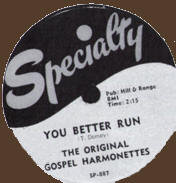 1928. At
this point in time (February, 2011) none of the L. of C. items have
appeared in any reissue programme. Though one different song is featured
by Rev. A.G. Holly on DOCD-5576. Interestingly a label shot of a
post-war You Better Run by the original Gospel Harmonettes, shows
a composer credit for “T. Dorsey”-aka former hokum/blues man ‘Georgia
Tom’ Dorsey.
1928. At
this point in time (February, 2011) none of the L. of C. items have
appeared in any reissue programme. Though one different song is featured
by Rev. A.G. Holly on DOCD-5576. Interestingly a label shot of a
post-war You Better Run by the original Gospel Harmonettes, shows
a composer credit for “T. Dorsey”-aka former hokum/blues man ‘Georgia
Tom’ Dorsey. 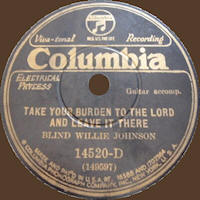 Add The
Seal Of God by Sister Mary Nelson, recorded 21/4/27. This takes
the No.3 slot nudging the Rev. E.D. Campbell entry into fourth
position. Though this is clearly inspired by Take Your Burden To The
Lord, Sister Nelson, an early raw and powerful singer as Bessie
Johnson or Ernia Mae Cunningham, has changed nearly all the lyrics and
substitutes the more familiar title with her own.
Add The
Seal Of God by Sister Mary Nelson, recorded 21/4/27. This takes
the No.3 slot nudging the Rev. E.D. Campbell entry into fourth
position. Though this is clearly inspired by Take Your Burden To The
Lord, Sister Nelson, an early raw and powerful singer as Bessie
Johnson or Ernia Mae Cunningham, has changed nearly all the lyrics and
substitutes the more familiar title with her own.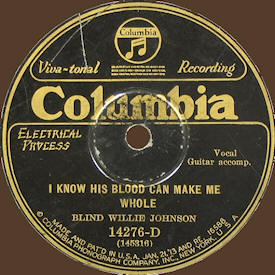 Blind Willie’s first session took
place on “Saturday, 3 December 1927”
Blind Willie’s first session took
place on “Saturday, 3 December 1927” 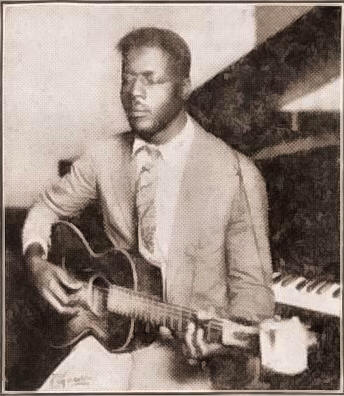
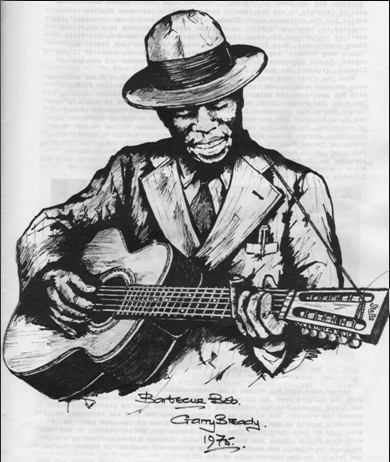
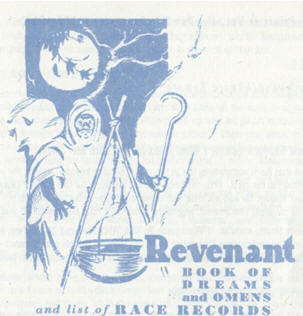 Smith sings the
words to a slow-paced tempo which for the most part uses the tune of I Know
His Blood Can Make Me Whole/She Touched The Hem Of His Garment ; though
neither of these titles are included in the lyrics. For the remainder of the
song, he seems about to leave the planet sky-wards with his eerie falsetto
cries! The ‘Transylvania-style’ organ, actually played by J. Roy Terry, only
adds to this amorphous atmosphere. Surely an inspiration for the record company
to use the name ‘Revenant’. According to Dean Blackwood who looked up a
definition, it is “a spirit who returns after a long absence”.
Smith sings the
words to a slow-paced tempo which for the most part uses the tune of I Know
His Blood Can Make Me Whole/She Touched The Hem Of His Garment ; though
neither of these titles are included in the lyrics. For the remainder of the
song, he seems about to leave the planet sky-wards with his eerie falsetto
cries! The ‘Transylvania-style’ organ, actually played by J. Roy Terry, only
adds to this amorphous atmosphere. Surely an inspiration for the record company
to use the name ‘Revenant’. According to Dean Blackwood who looked up a
definition, it is “a spirit who returns after a long absence”.
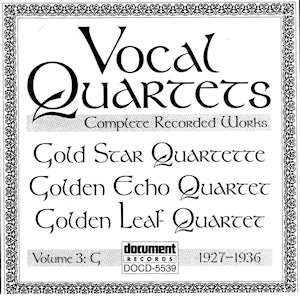
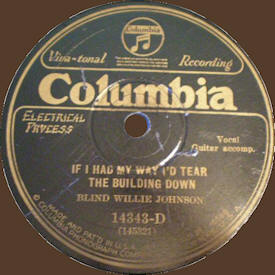 However, take 2 of
the Paramount Jubilee song (take 1 should have remained unissued!) has only
marginal links with the song later made famous by Blind Willie Johnson as If
I Had My Way I’d Tear This Building Down [Columbia 14343-D]. The tune is at
best an approximation of ‘Way’ although the young woman’s piping vocal does
include two verses about Samson. But basically it can be heard as yet another
‘Witness For My Lord’ and no mention of having her way tearing down buildings,
etc. The same can be said of the earliest recorded “Witness” by the Fisk
University Jubilee Singers in 1911.
However, take 2 of
the Paramount Jubilee song (take 1 should have remained unissued!) has only
marginal links with the song later made famous by Blind Willie Johnson as If
I Had My Way I’d Tear This Building Down [Columbia 14343-D]. The tune is at
best an approximation of ‘Way’ although the young woman’s piping vocal does
include two verses about Samson. But basically it can be heard as yet another
‘Witness For My Lord’ and no mention of having her way tearing down buildings,
etc. The same can be said of the earliest recorded “Witness” by the Fisk
University Jubilee Singers in 1911. 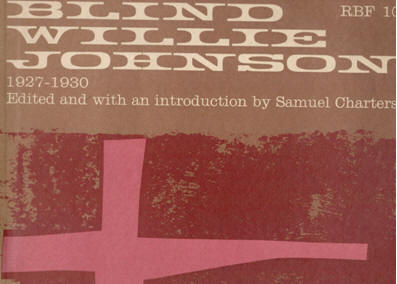
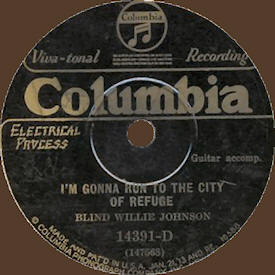 From a very
different source, in search of the roots of Blind Willie Johnson’s songs, I came
across a probable link with black artists in the Harlem Renaissance in the
early part of the 20th. century! In her book, Ms. Abramson writes:
“Twenty plays, the work of seventeen playwrights, are considered”.
(26)This is between 1925 and 1959. One of the
earliest, and finest, was Wallace Thurman “who with the assistance of William
Jourdan Rapp [white] wrote the play Harlem (1929)”.
From a very
different source, in search of the roots of Blind Willie Johnson’s songs, I came
across a probable link with black artists in the Harlem Renaissance in the
early part of the 20th. century! In her book, Ms. Abramson writes:
“Twenty plays, the work of seventeen playwrights, are considered”.
(26)This is between 1925 and 1959. One of the
earliest, and finest, was Wallace Thurman “who with the assistance of William
Jourdan Rapp [white] wrote the play Harlem (1929)”.
